What to Read When You No Longer Have Faith in the Christian Tradition
We live in an increasingly secular American civilization. In this new age, faith is in retreat from the public foursquare, and traditional institutions like the church are no longer functioning with the cultural authorisation they once held in generations past. Today, nearly half of America is unchurched. Just fifty-fifty though more than and more than Americans are abandoning the institutional church and its defined purlieus markers of religious identity, many still believe in God and do faith outside its walls.
This is the first of a two-part exploration of faith and spirituality exterior the church. Let'southward outset with a wait at the fascinating segment of the American population who, as the maxim goes, "beloved Jesus merely not the church." (Return next calendar week when Barna will interruption down the identity of the "spiritual, but not religious.")
Traditionally Christian—with Exceptions
To get at a sense of indelible faithfulness among Christians despite a rejection of the institutional church building, Barna created a metric to capture those who about neatly fit this description. It includes those who self-identify as Christian and who strongly agree that their religious religion is very important in their life, but are "dechurched"—that is, they accept attended church in the by, but haven't washed then in the last vi months (or more). These individuals have a sincere faith (89% take made a personal commitment to Jesus Christ that is still important to their life today), simply are notably absent from church.
According to aggregate Barna tracking data, this group makes up 1-tenth of the population, and information technology's growing (up from vii% in 2004). The majority are women (61%), and iv-fifths (80%) are between the ages of 33 and lxx. That is, they are by and large Gen-Xers (36%) and Boomers (44%), not Millennials (14%) or Elders (6%). Though Millennials are the least churched generation, they are too the least likely to either place every bit Christian or say faith is very important to their life, explaining their underrepresentation among this group. Elders are underrepresented for the opposite reason—they are the generation virtually likely to attend church regularly.
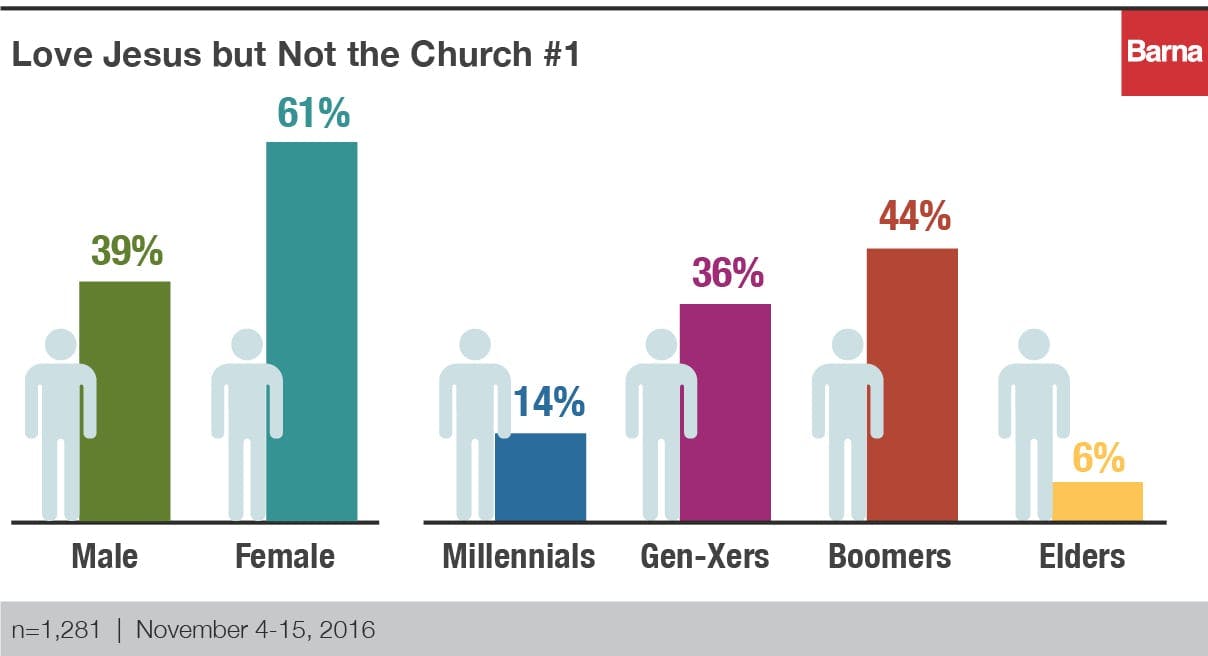
This group besides appears to be mostly white (63%) and concentrated in the Due south (33%), Midwest (30%) and West (25%), with very few hailing from the Northeast (13%)—a region typically home to the well-nigh post-Christian cities in America. The fact that they are just as probable to place as Democrat (thirty%) than Republican (25%) is interesting, specially for Christians and those in the Southward and Midwest, who typically are disproportionately Republican. It'southward possible that left-leaning people of faith are encountering some level of political discord with their church building, which may have prompted an exit.
Left-leaning people of religion may encounter political discord with their church, prompting an exit. Click To Tweet
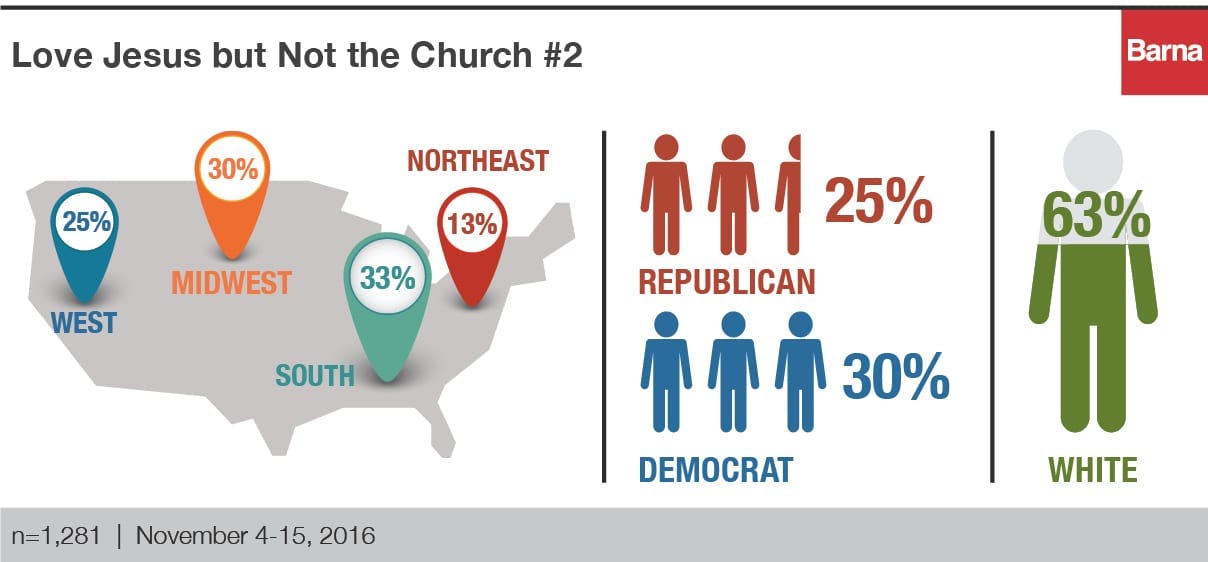
Orthodox Belief Despite Church Absenteeism
Despite leaving the church, this group has maintained a robustly orthodox view of God. In every case, their behavior virtually God are more orthodox than the general population, even rivaling their church-going counterparts. For instance, they strongly believe at that place is only one God (93% compared to U.South. adults: 59% and practicing Christians: 90%); affirm that "God is the all-powerful, all- knowing, perfect creator of the universe who rules the globe today" (94% compared to U.South. adults: 57% and practicing Christians: 85%); and strongly hold that God is everywhere (95% compared to U.Southward. adults: 65% and practicing Christians: 92%).
When it comes to behavior nigh God, those who "love Jesus but non the church building" are orthodox. Click To Tweet
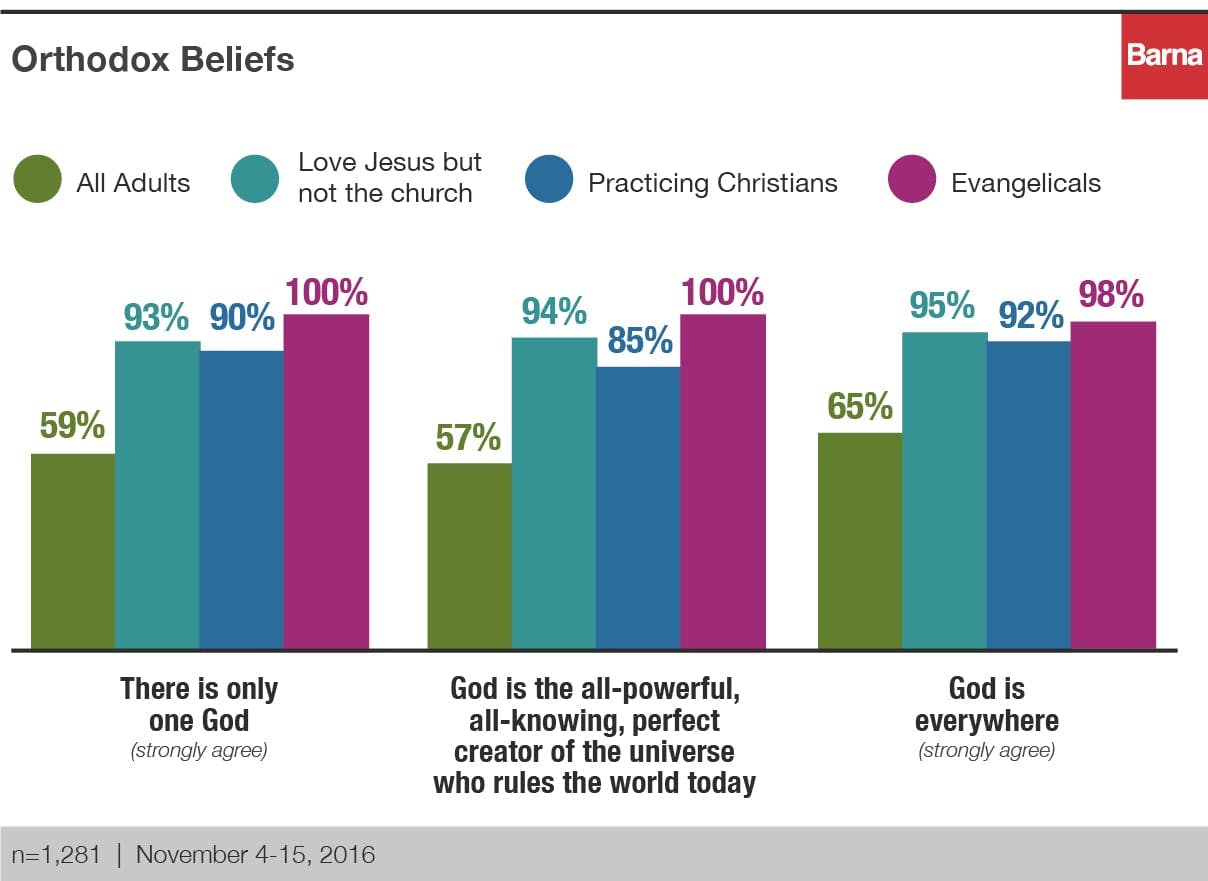
Positive, if Baggy, Views of Religion
Despite their credible discomfort with the church building, this grouping still maintains a very positive view of religion. When asked whether they believe religion is by and large harmful, their response in one case again stood out from the full general population, and aligned with their church-going counterparts (71% strongly disagree, compared to 71% among practicing Christians and 48% amidst U.S adults).
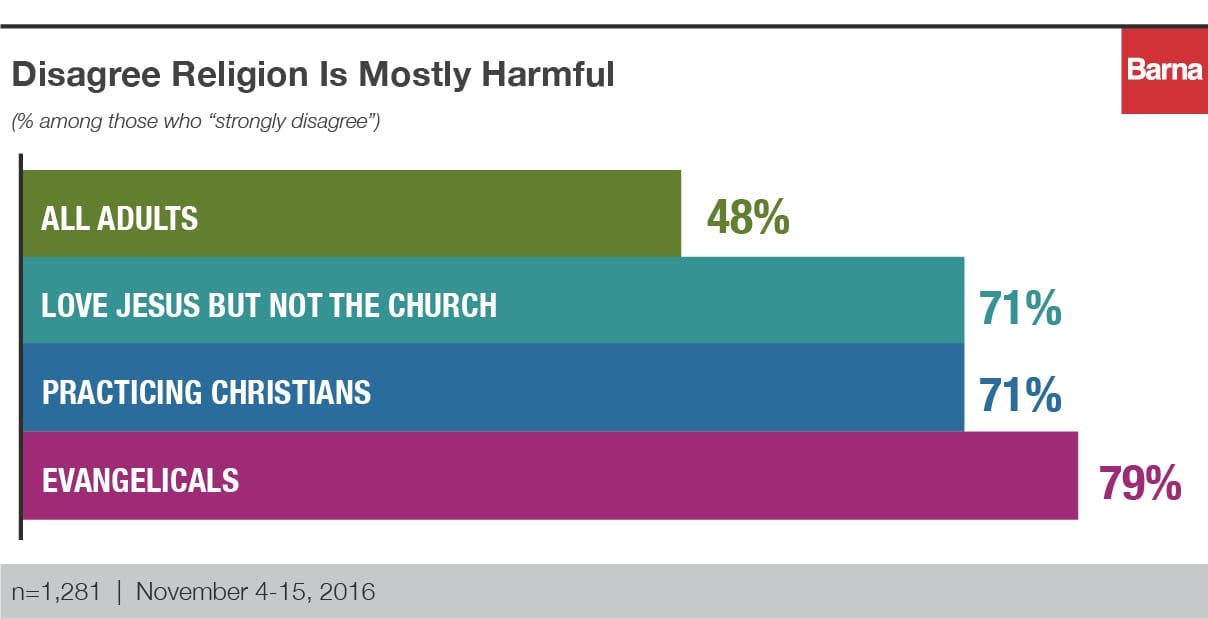 Just the story changes slightly when information technology comes to the distinctiveness of Christianity: Merely over half (55%) disagree (strongly and somewhat) that all religions basically teach the same thing, much closer to the full general population (51%) than practicing Christians (68%), and even further from evangelicals (86%). In the absence of a rigid religious identity provided past the authority of the church, this group appears to be more affirming of the claims of other religions and open up to finding and identifying common basis.
Just the story changes slightly when information technology comes to the distinctiveness of Christianity: Merely over half (55%) disagree (strongly and somewhat) that all religions basically teach the same thing, much closer to the full general population (51%) than practicing Christians (68%), and even further from evangelicals (86%). In the absence of a rigid religious identity provided past the authority of the church, this group appears to be more affirming of the claims of other religions and open up to finding and identifying common basis.
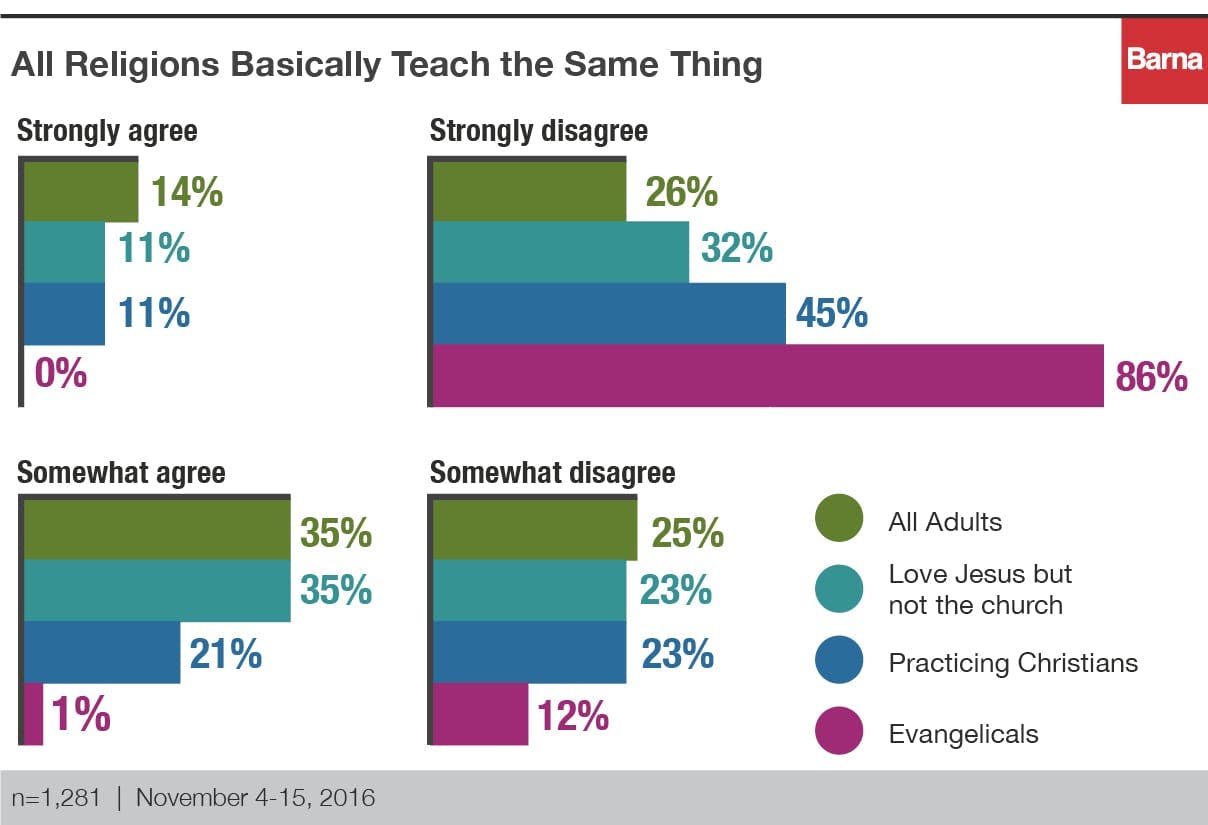
Privately Spiritual
Due to their enduring religious affiliation and overtly religious religion, this grouping falls outside of the characterization of "spiritual just not religious" folks—the topic of adjacent week's commodity. But 1 affair they do share is a sense of spirituality. Slightly fewer than nine in 10 (89%) identify every bit "spiritual," on par with practicing Christians (90%), and far exceeding the national average (65%).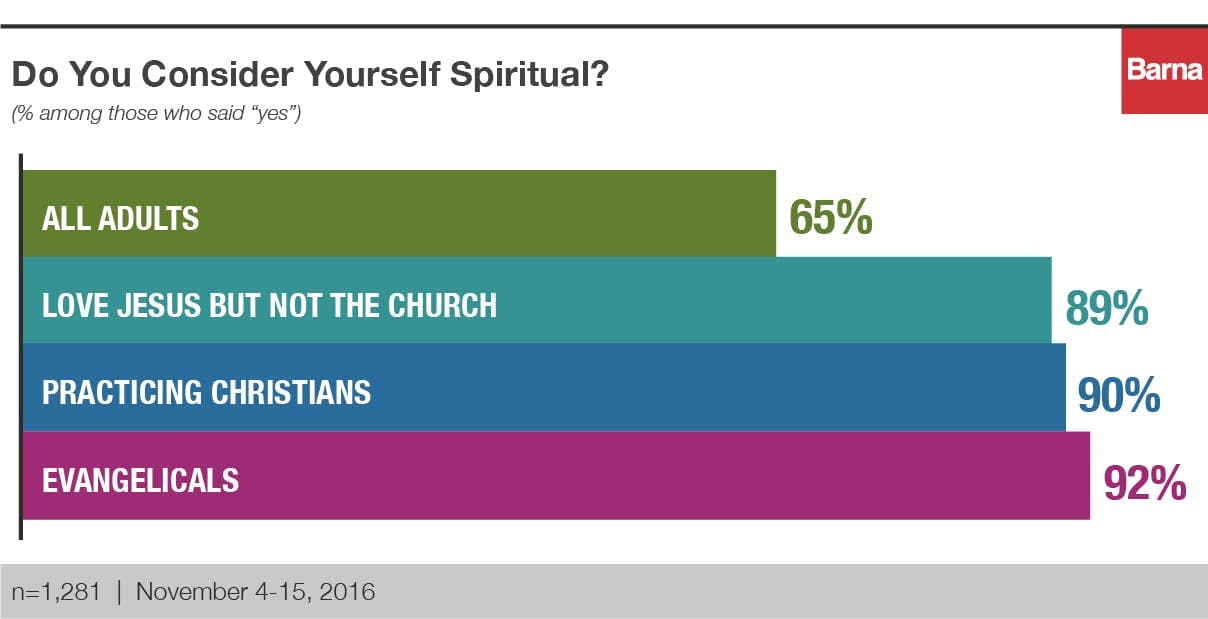 Only unlike practicing Christians and evangelicals, this spirituality is deeply personal—even private—with many preferring to go along spiritual matters to themselves: but two in 5 (18%) say they talk with their friends near spiritual matters often. This is less than one-half as much as practicing Christians (41%), and most four times less than evangelicals (67%), who are known for evangelizing and sharing their religion. When asked specifically most evangelizing—whether they personally have a responsibility to tell others about their religious beliefs—the differences are even more striking. Fewer than three in x of the "love Jesus but not the church" group agrees strongly that they have a responsibility to proselytize (28%), compared to more than half of practicing Christians (56%) and all of Evangelicals (100%). So, while "spiritual" topics may oft or sometimes come up, the bodily deed of trying to catechumen someone is a depression priority for this grouping.
Only unlike practicing Christians and evangelicals, this spirituality is deeply personal—even private—with many preferring to go along spiritual matters to themselves: but two in 5 (18%) say they talk with their friends near spiritual matters often. This is less than one-half as much as practicing Christians (41%), and most four times less than evangelicals (67%), who are known for evangelizing and sharing their religion. When asked specifically most evangelizing—whether they personally have a responsibility to tell others about their religious beliefs—the differences are even more striking. Fewer than three in x of the "love Jesus but not the church" group agrees strongly that they have a responsibility to proselytize (28%), compared to more than half of practicing Christians (56%) and all of Evangelicals (100%). So, while "spiritual" topics may oft or sometimes come up, the bodily deed of trying to catechumen someone is a depression priority for this grouping.
This spirituality is deeply personal, with many preferring to continue spiritual matters to themselves. Click To Tweet
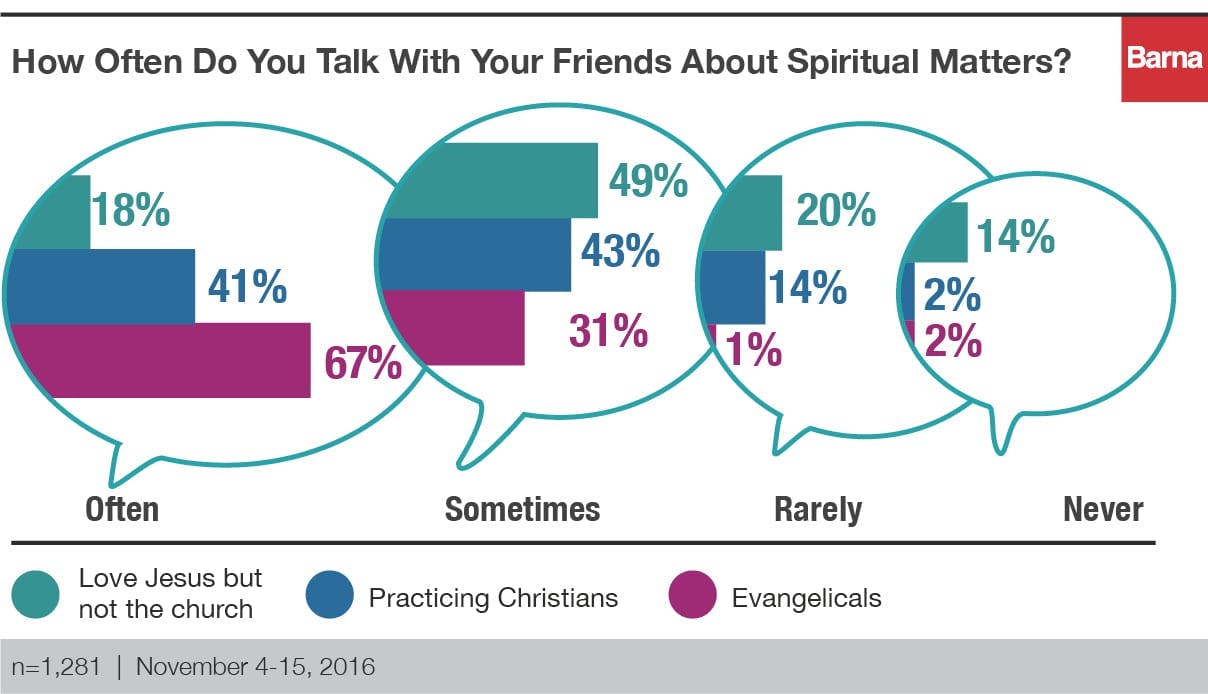
Informal Paths to God
This grouping still actively practices their faith, albeit in less traditional means. They maintain an active prayer life (83%, compared to 83% of practicing Christians), only simply read scripture one-half as much as the average practicing Christian (26% compared to 56%). In addition, they are much less likely to read a book on spiritual topics (9% compared to 36% of practicing Christians), and never nourish groups or retreats (compared to 24% of practicing Christians). This all points to a broader abandonment of authoritative sources of religious identity, leading to much more than informal and personally-driven religion practices. They are certainly still finding and experiencing God, merely they are more probable to do so in nature (32% compared to 24% of practicing Christians), and through practices like meditation (20% compared to 18%), yoga (10% compared to 7%) and silence and solitude (both fifteen%).
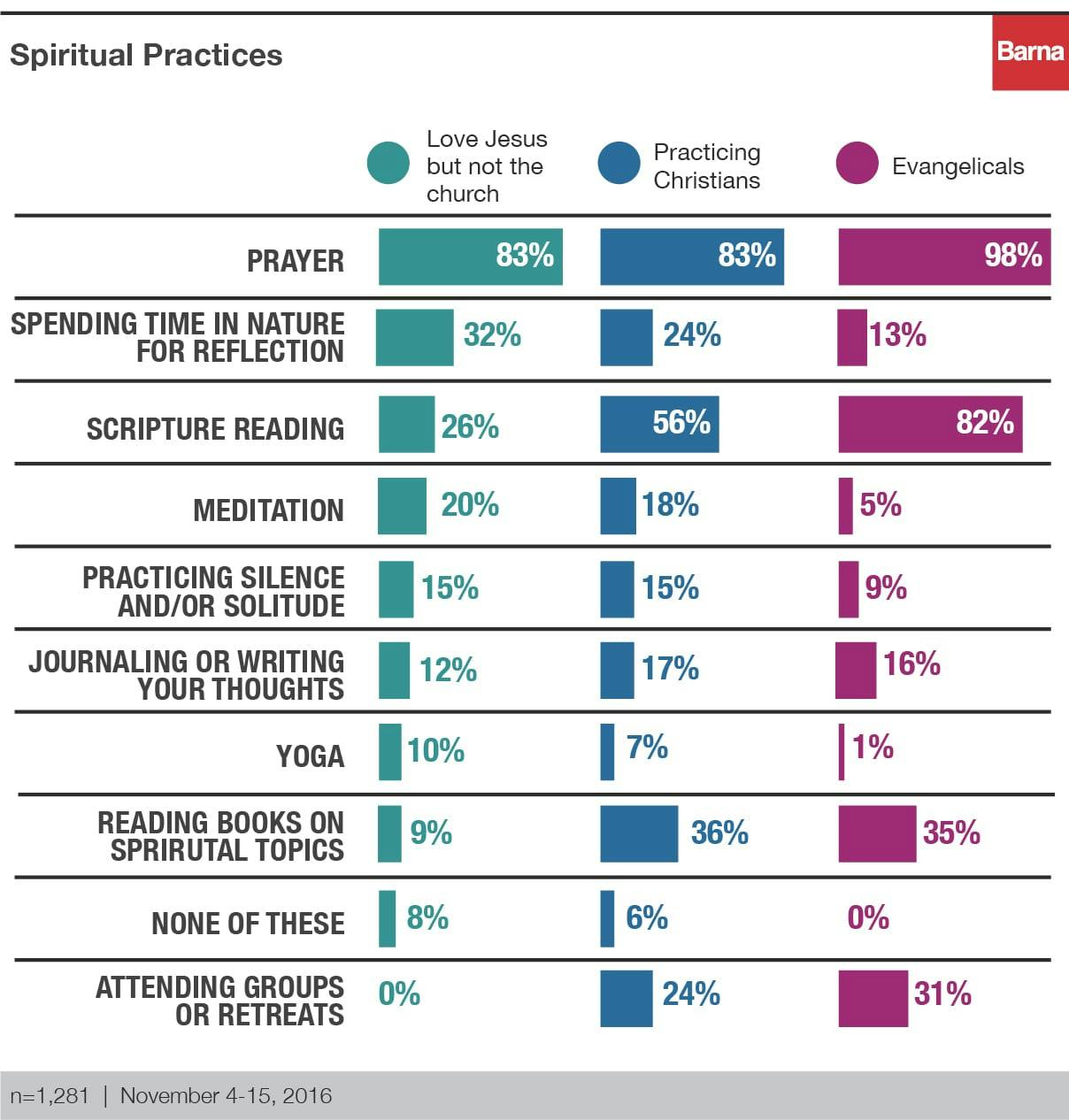
What the Research Ways
We will explore this topic of faith outside the church building much more in the coming weeks, but one thing that's most worth noting among this group of people who "love Jesus but not the church building" is their connected commitment to organized religion. "This group represents an of import and growing avenue of ministry for churches," says Roxanne Stone, editor in chief of Barna Grouping. "Particularly if you live in a more churched area of the land, information technology'southward more than than probable you have a pregnant number of these disaffected Christians in your neighborhoods. They still love Jesus, still believe in Scripture and almost of the tenets of their Christian organized religion. But they have lost faith in the church. While many people in this group may exist suffering from church wounds, we besides know from past research that Christians who practise not nourish church say it's primarily not out of wounding, but because they can observe God elsewhere or that church building is not personally relevant to them. The critical message that churches need to offer this group is a reason for churches to be at all. What is it that the church building tin offer their faith that they tin can't get on their own? Churches need to exist able to say to these people—and to respond for themselves—that there is a unique way you can detect God just in church. And that faith does not survive or thrive in solitude."
Comment on this research and follow our piece of work:
Twitter: @davidkinnaman | @roxyleestone | @barnagroup
Facebook: Barna Group
Most the Research
Interviews with U.South. adults included 1,281 web-based surveys conducted amid a representative sample of adults over the age of xviii in each of the 50 United States. The survey was conducted November 4-xv, 2016. The sampling fault for this report is plus or minus 2.9 percentage points, at the 95% confidence level. Minimal statistical weighting was used to calibrate the sample to known population percentages in relation to demographic variables.
Millennials: Built-in between 1984 and 2002
Gen-Xers: Born betwixt 1965 and 1983
Boomers: Born between 1946 and 1964
Elders: Born between 1945 or earlier
Practicing Christian: Those who attend a religious service at to the lowest degree once a month, who say their religion is very important in their lives and self-identify as a Christian.
Evangelicals: run across 9 specific theological criteria. They say they have made "a personal delivery to Jesus Christ that is still important in their life today," that their religion is very important in their life today; believe that when they die they will get to Heaven because they have confessed their sins and accepted Jesus Christ as their Savior; strongly believe they have a personal responsibility to share their religious beliefs nearly Christ with not-Christians; firmly believe that Satan exists; strongly believe that eternal salvation is possible only through grace, not works; strong agree that Jesus Christ lived a sinless life on earth; strong assert that the Bible is authentic in all the principles information technology teaches; and describing God equally the all-knowing, all-powerful, perfect deity who created the universe and even so rules it today. Being classified as an evangelical is not dependent on church building attendance, the denominational affiliation of the church building attended or self-identification. Respondents were not asked to describe themselves as "evangelical."
About Barna
Barna research is a private, not-partisan, for-turn a profit organization nether the umbrella of the Issachar Companies. Located in Ventura, California, Barna Group has been conducting and analyzing chief research to understand cultural trends related to values, behavior, attitudes and behaviors since 1984.
© Barna Group, 2017
Source: https://www.barna.com/research/meet-love-jesus-not-church/
Post a Comment for "What to Read When You No Longer Have Faith in the Christian Tradition"